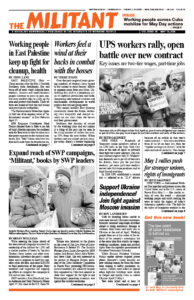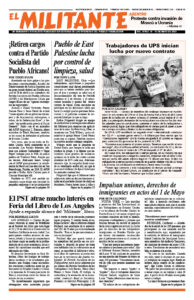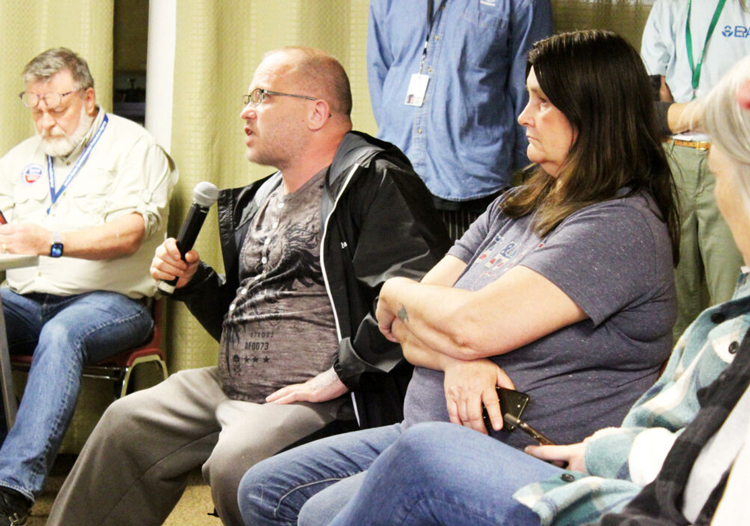EAST PALESTINE, Ohio — Three months after the Feb. 3 Norfolk Southern train derailment, fire and burn-off of toxic vinyl chloride here, workers, farmers and small-business people continue to press to gain control over needed steps to clean up the area and protect their health. Their efforts are aimed at both the rail bosses and government authorities.
The Environmental Protection Agency held one of an ongoing series of “informational sessions” in East Palestine April 27.
EPA Response Coordinator Mark Durno claimed there is little to no risk of vinyl chloride exposure, but residents took the floor to insist they’ve taken tests that prove exposure to the chemical continues. Eric “Jake” Cozza, who lives less than half a mile from the derailment site, spoke at the meeting, the Salem News said, pointing to results of his urinalysis that shows the chemical’s presence.
“I know that blood and urine samples with these compounds are an increasing concern,” Durno admitted. “We know the site is contaminated. We have the river. Sulphur Run is contaminated and part of Leslie Run is contaminated. And with the work that is going on [by Norfolk Southern contractors] there is the potential for vapors to be released.
“I was just down at a house watching the operation from the backyard,” Durno said. “And as the excavation was going on and the wind flow was actually in my direction, I got a small whiff of butyl acrylate.” That’s another dangerous chemical released in the burn-off, that causes throat and skin irritation and can have long-term respiratory problems — symptoms people there complain about.
Rev. Barry Walker, who lives a mile from the site, said the EPA needed to change its decision to not test farther out into the community. “There are some of us a mile or two out from this thing. You don’t cover us. You are not checking” the air, he said.
Erin Stauffer, a social services administrator, told the Militant she had raised her concerns about the lack of information being given to residents at a recent meeting of the East Palestine Council. “The council isn’t saying anything about things like reparations,” she told the council meeting. “People don’t know what’s going on.”
There are still a number of people who lived near the derailment site who are living in limbo. Jeff Drummond, a retired truck driver, is still barred from returning to his home because of ongoing work there. He’s stuck in a tiny room at the Davis Motel in North Lima. “I have nothing here,” he told Salem News.
The rail bosses say it will take another two months to finish removing the contaminated soil from the derailment site and they haven’t even begun cleaning up contaminated sediment at Leslie Run.
Militant worker-correspondents Samir Hazboun and Kathie Fitzgerald stopped in at Reidy’s Hog and Beef Farm near East Palestine April 30. Farmer and full-time worker Dave Reidy signed the family up for soil and water testing they believed would be paid for by Norfolk Southern a month and a half ago, concerned about planting the corn and hay they feed their animals. “We still haven’t heard from anyone,” he told us.
He said they’ve decided to go ahead and plow the fields. “If we wait for answers, we’ll never know anything.”
Fight for information, action
Socialist Workers Party members Dave Ferguson and Kaitlin Estill talked with Michelle and Dave Shafer in East Palestine. A front yard sign said, “We stand together against Norfolk Southern.” She works in building restoration and Dave works at an auto body shop.
Michelle Shafer described their experiences coming home after being evacuated during the burn-off of vinyl chloride in February. “After taking my first shower I broke out in a severe rash,” she said. “I went to the Norfolk Southern-sponsored clinic. It was a joke.”
“We need to know what chemicals are on the trains coming through our town,” Dave Shafer said. He had served as a volunteer firefighter, and “local volunteer firefighters need to know so they know how to fight the fires.”
“We need a real clinic that will take us seriously,” said Michelle Shafer. Estill responded, “Yes, what you describe reminds me of what happens when you get hurt at work and have to go to the company doctor.”
“What if we get cancer five or 10 years down the road? We need to make sure we are covered,” Dave Shafer said. “We can’t trust the government or the politicians and we can’t trust the companies like Norfolk Southern.”
“That’s why working people here should keep fighting for what we need,” Ferguson said, “information we can rely on about what the real dangers are, as well as control over the cleanup and health care for as long as necessary.”
Pressure on the government
Another indication of the pressure government authorities face is the release of a third Federal Railroad Administration safety advisory since the derailment, titled “Accident Mitigation and Train Length.”
The advisory highlights a series of safety challenges caused by hauling longer and longer trains, challenges that rail workers and their unions have repeatedly pointed to. Longer and heavier trains create problems with control of braking and train handling for the engineer and the greater possibility of loss of radio communication between crew members and with train systems. And the Federal Railroad Administration says, “The operation of longer trains may, in certain instances, exacerbate the impact of blocked crossings on communities.”
In announcing its first quarter financial report Norfolk Southern bosses said that even with the $387 million in estimated costs from the derailment, including costs for cleanup of the site, “community support” and cash payouts, and a preliminary estimate of claims and settlements, the company still made $466 million in profits.
One of the reasons profits rose was because they raised rates on shippers for most of the cargo they haul.
The company also revealed that, for now, the railroad had made some operational changes limiting train length and capacity and adjusting the way it assembles its trains. This too reflects the outcry from East Palestine and rail workers’ persistent fight for safety.
Alongside working people in East Palestine, rail workers continue to look for ways to fight for control over the conditions they work under and their torturous schedules.


